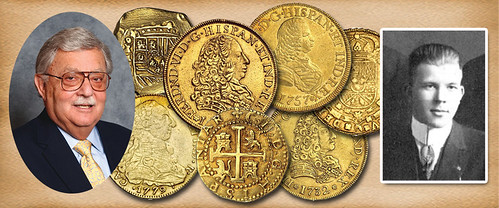
PREV ARTICLE
NEXT ARTICLE
FULL ISSUE
PREV FULL ISSUE
HARVEY STACK ON THE JOSIAH K. LILLY COLLECTION, PART 1
Harvey Stack is one of our favorite old-time numismatists, and his recollections of old-time collectors and their collections feature
prominently in his Stack's Bowers blog. On May 5, 2016 he published the first part of a series on the Josiah K. Lilly Collection.
Here's an excerpt - the full article is available online. We'll look forward to more installments. -Editor

In the spring of 1951, a well-dressed, debonair gentleman came into our shop. He wanted to know if we had any doubloons, from Central and South America to show him. Stack's always maintained a vast and diverse inventory and we took out a few Spanish Colonial gold coins to show him. He introduced himself as Josiah K. Lilly, the chairman of his family's pharmaceutical business, Eli Lilly and Company, headquartered in Indianapolis. He explained he had a passion to learn more about the coins that gained their fame during Spanish Colonial days. The coin that was most talked about was the '”doubloon,” or 8 Escudos. My father, Morton Stack, and my uncle, Joseph B. Stack, were working at the counter that day and began showing J.K. Lilly gold doubloons that we had in stock. These included the somewhat crude early issues, known as cobs due to their somewhat irregular shape. He also examined the various portraits of Spanish kings that appeared on the later issues. Morton and Joseph advised Mr. Lilly that these coins were made and struck in various South American countries, identified by the mintmark on them, and also the assayer’s initials, which gave assurance that the fineness of the gold and weight were verified and therefore official. It was discussed how these were used in trade and also to pay the troops who occupied and ran the countries occupied by the Spanish. However, at least 20% of all the gold mined was sent back to Spain as compensation to the King who helped finance the expeditions. That portion of the gold was called "The Royal Fifth," and these shipments were a great temptation to pirates of the day. Many treasure ships were captured, looted and sunk during this period of Spanish domination of the Western Hemisphere. These were the coins that Josiah K. Lilly desired. They proved to him that gold coins were actually minted and then plundered by the pirates — here was the evidence. From Stack's stock at the time, we gathered for him 12 different pieces, some from different mints of Central and South America, a cob or two, and for the balance, pieces with the portraits of the various kings of Spain. J.K. Lilly was amazed with what we were able to show him, and he decided to purchase all 12 to start his collection. My father and uncle introduced me to him. I was the only junior Stack in Stack's at the time, as my cousin Benjamin had left to try his luck in Las Vegas, and Norman, his brother, was in military service. Later on, since J.K. Lilly liked personal deliveries to Indianapolis, I became the appointed messenger to him, whenever either senior Stack could not make the trip. In my next article I will discuss more about Mr. Lilly’s first visit to Stack’s in New York City. The future would bear out what an important visit it was. To read the complete article, see:
Wayne Homren, Editor The Numismatic Bibliomania Society is a non-profit organization promoting numismatic literature. See our web site at coinbooks.org. To submit items for publication in The E-Sylum, write to the Editor at this address: whomren@gmail.com To subscribe go to: https://my.binhost.com/lists/listinfo/esylum All Rights Reserved. NBS Home Page Contact the NBS webmaster 
|